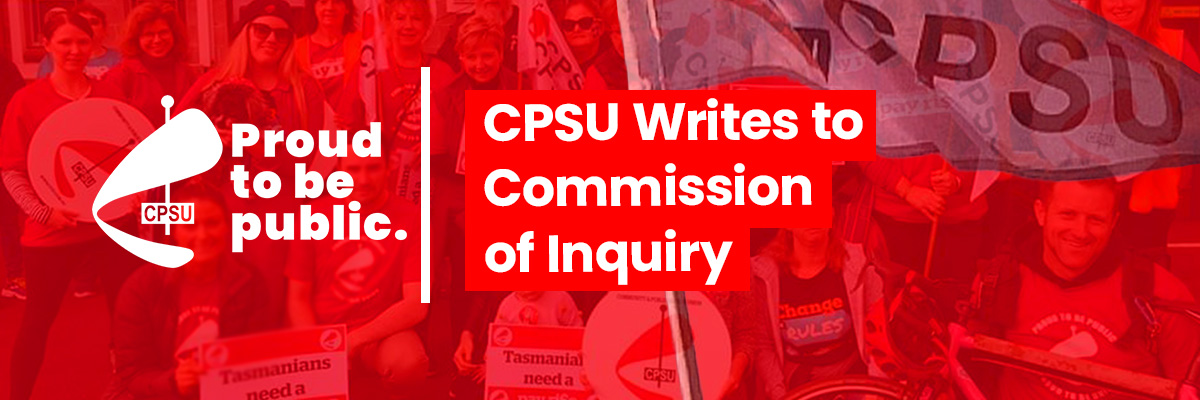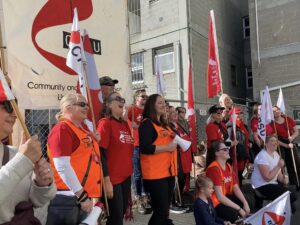
CPSU General Secretary Thirza White wrote to the Commission of Inquiry into the Tasmanian Government’s Responses to Child Sexual Abuse in Institutional Settings. Under its terms of reference, the Commission has been asked to inquire into what the Tasmanian Government should do to:
- better protect children against child sexual abuse in institutional contexts in the future
- achieve best practice in the reporting of, and responding to reports or information about allegations, incidents or risks of child sexual abuse in institutional contexts
- eliminate or reduce problems that currently prevent appropriate responses to child sexual abuse in institutional contexts, including addressing failures in, and barriers to, reporting, investigation and responding to allegations and incidents of abuse, and
- address or alleviate the impact of past and future child sexual abuse in institutional contexts, including, in particular, in ensuring justice for victims through processes for referrals for investigation and prosecution and support services.
As the union representing workers in our Child Safety system, CPSU members have campaigned tirelessly to secure adequate funding to meet the crisis-levels of demand in our Child Safety Service, Advice & Referral Line, and Family Violence Counselling Support Service. After being repeatedly ignored by the State Government, members have now stepped forward to give evidence by sharing their stories. All of the following comments were shared under the protection of anonymity. Workers disclosed their fear of repercussions for honestly reporting the state of our child protection service.
Their concerns address the chronic underfunding of the service have prevented them from keeping up with extreme demand. They highlight that funding to address workforce shortages is urgently needed, along with improved supports in place for workers experiencing vicarious trauma and psychological injury. Most of all – they highlight how Child Safety workers need the Tasmanian community to stand in solidarity with them to force the Rockliff Government to act.
- Chronic Underfunding Means Workers are being Pushed to the Brink
“There are insufficient workers to cope with the volume of work. High stress job results in high turnover resulting in less experienced staff. ARL is not resourced adequately to do effective early intervention work with families.”
“Child safety Officers do not get paid appropriate rates for the complex nature of the work they do. Workers have high caseload numbers, inadequate clinical supervision and lack support in managing the work. Inexperienced practitioners working with the most vulnerable people in our community is a recipe for disaster! More needs to be done to adequately train & support the staff so that children can be kept safe & nurtured.”
“It’s time for the government to stop making excuses and put some serious investment into the Child Safety Service. It shouldn’t be either NGO supports or Child Safety funding, it should be both. We’ve had enough reviews, reforms, realignments and redesigns. It’s time for them to show some respect by investing in recruitment, retention, resourcing and remuneration for Child Safety.”
“We are so desperately understaffed. [More than] 100 children we have parental responsibility for who don’t have an allocated worker. Without workers to know and support these children there is no one to hear their voices and action what they need.”
- Unsafe Caseloads – More Workers Needed to Keep Up with Demand
“There are not enough workers on the ground to carry out child protection work. Out of home care workers in the south have had continuous, excessive caseloads for years. This means that carer households miss out on frequent visits, checks and training. New CSO’s are not well trained before receiving a caseload. Practice leaders are not supposed to carry a case load – but do!”
“The biggest frustration is the lack of resources, mainly actual workers, so we all have the time to do our jobs properly. There is also a lack resources in the community such as AHPs, family support workers, you name it, every support you can think of.“
- Government Fudges Statistics for Favourable Headlines
“We have 165 children without an allocated worker and soon that will hit close to 200 with another 2 workers leaving. It is not the 50-odd that is reported. Figures are wrong as it looks only at teams 4 through to 9. It doesn’t include team 10 in any statistics and they look after over 150 children. It doesn’t include the almost 70 children that can’t be moved from assessment teams 1 through 3 that are waiting to move to case management. There are children hidden under practice leaders and practice managers that are also hidden.”
- Workforce Shortages due to Lack of Public Sector Parity
“We have too few psychologists who understand childhood trauma in our state. We have no placements for children and to get a special care package is almost impossible as the state literally can’t afford them. Carers are not reimbursed adequately for what children cost to raise. Community expectations are unrealistic as we don’t have staff [and] can’t keep the ones we have.”
“We can’t keep staff because it is the lowest paid in any state let alone [in comparison] to NGOs in Tasmania. A recent employee quit and moved to and NGO for $30,000 more than they [previously received] to be over worked and unappreciated by the community.”
- Occupational Violence Rife – Workers need Trauma-safe Workplaces
“We have security on site every day and we are threatened and harassed in our workplace daily. Death threats are common. “
The CPSU has also supported countless members through harrowing experiences, spanning from occupational violence and aggression to attempted arson of their workplaces. It’s impossible to fully account for the number of passionate and dedicated workers who have had to walk away from the service due to the lack of support in place after experiencing violence, aggression, or trauma in their line of duty.
- Child Safety Not a Priority of Government
“I can’t believe the $ figures being discussed for the AFL stadium and what has already been spent on the basketball, compared to what was spent for CSS for a complete reform. But I guess abused children are not something people want to talk about at weekend BBQs, so no votes in putting money into our service.”
- Child Safety Workers Need Community Support
“We keep coming to work every day because we want the best for the kids but our own system works against us.”
But ultimately, as the same member shares, it will remain a case of one step forward, one step back unless the Tasmanian community stands with workers to force our Government to recognise and resolve the crisis:
“We aren’t supported, we aren’t resourced, and we don’t have the processes we need to do good jobs. We are abused for the work we do, by other services as much as by clients, but we are powerless to improve the system. We aren’t heard or listened to.”
In closing, as another shares:
“So, all that aside – why do we do this? Because we believe that the community can come together and we can make safety happen. We believe the families hold the answers [but] we can help guide them to keep their own children safe with the help of all service working together and not passing the buck. We believe extended families and friends need to step up and be the network families need. What would we like? The community, our partners, Education, Police, CAMHS, the RHH to acknowledge we are professionals and experts in our field by being respectful of us.”
Tasmanians Must Stand with Child Safety Workers
As a union, we encourage the Commission of Inquiry to support current Child Safety Service workers to speak privately to the inquiry. This year CPSU members in our Child Safety Service will bargain for improvements to their wages and conditions.
Workers have flagged the need to create trauma-safe workplaces, including improved debriefing and leave after major incidences, better mental health support along with demand-based funding and staff ratios in Child Safety Services. Ratios, like those that exist in Hospitals and Child Care Centres, would ensure that as the number of calls/notifications to the Advice and Referral Line increase; as the number of kids in care, on protection orders, or in out of home care increase; in turn the number of workers also increases automatically.
We are also encouraging the Department to review the existing salary and working arrangements to ensure Child Safety is best placed to attract and retain staff. Without addressing these critical issues, Child Safety and the Advice and Referral Line will continue to struggle with recruitment and retention of workers. This will serve only to exacerbate the existing staffing issues and inability to meet demand, putting vulnerable children at risk. We can’t allow that to happen.
Click Here to read our Full Letter to the Commission.
The Commission will provide its final report and recommendations by 1 May 2023. Workers can give evidence by sharing their stories with the CPSU. We will share your story anonymously to help build community awareness and force the Rockliff Government to act. Contact us at communications@tas.cpsu.com.au.
If you or anyone you know needs help:
- Lifeline (24 hours) 131 114
- Griefline 1300 845 745
- Beyond Blue 1300 224 636
- Sexual Assault Support Service (24 hours) 1800 697 877
- Laurel House Northern Tasmania (03) 6334 2740
- Laurel House North West Tasmania (03) 6431 9711
- Blue Knot Foundation 1300 657 380
- Strong Families, Safe Kids 1800 000 123
- 1800 RESPECT 1800 737 732
- MensLine Australia 1300 789 978
- Relationships Australia 1300 364 277








